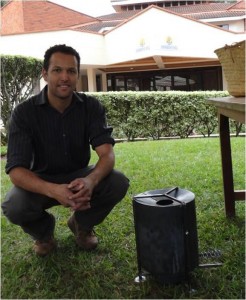Looking Ahead: Returning to Africa
This year, Diane will return for her fourth trip to East Africa to profile new startups, develop partnerships and report on how young innovations grow to scale up. In the coming weeks, we’ll be introducing some of the teams she’ll be spending time with. Got any leads? Tweet us @ynginventors or send us an email!
Profile: Kenya Stove
Diane talked to Payan ole-MoiYoi in Portland, OR in September and was impressed. Payan is half Maasai, grew up in Kenya and studied at Princeton. As an engineer he set out to solve a huge problem in East Africa – deforestation and disease from cooking fires. These fires trap women and children in toxic fumes at a rate comparable to smoking 20 cigarettes a day! Thus, Payan set out to launch Kenya Stove. He is building a stove to “improve health, reduce environmental impact, and save families money.”
It’s hard getting started, even with some funds. Erin Engelson, Payan’s partner, said this week, “Things are moving, albeit pole-pole (Swahili: slowly). We have done some cookstove testing with Kenyan cooks to get feedback on our design [and] made some partnerships here in Kenya that will help us get our ideas off the ground.”
Payan’s great Kickstarter page tells it all, and Diane hopes to document the thrills and headaches of starting up Kenya Stove in Nairobi!








